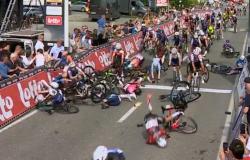
With a little delay, now everyone is saying it: the transition of bills from the greater protection service, managed by the Energy Authority (Arera), to the free market, managed by private individuals, will lead to greater spending on electricity by Italian families. Although reluctantly, or at least so it seemed, the government led by Giorgia Meloni has decreed the end of the protected market for both gas and electricity supplies. In this way, first methane, starting from last January, and then electricity, starting from next July, will see the passage to private individuals who for several months now have started a commercial battle to grab more and more customers. The result, now more visible than ever, is to have transformed the bill market into a jungle where not very transparent but very aggressive call centers try to convince new customers to switch with their company because the savings are guaranteed. There’s just one problem: it’s not like that.
At least not for Arera, which is ruled by the Court of Cassation in the matter of bill expenses: in the next three months, those who pay their electricity bill according to the protected market will have a saving of around 20% (exactly 19.8%). Arera thus decided for the last time the price of electricity for those who still wanted to remain with the prices administered by a public authority. Last because, starting from July, the protected market will remain in force only for those who are part of the “vulnerable” category, families in particular disadvantaged conditions who number around 4.5 million. A similar figure, which until a few months ago was included in Arera prices, is instead either already moving to the free market under the pressure of an army of hundreds of small, medium and large energy companies who are fighting each other for new customers, or will move to gradual protection service (Stg), a sort of limbo for the next three years – barring extensions which are never excluded in this context – which will follow rules that are in turn different from both those of the free market and the former protected market.
A jungle, indeed. Those who lose out are the families who, seduced by the promises of easy and ever-increasing savings, find themselves paying more, as was largely predictable in a market where, trying to simplify, hundreds of private operators all pay for the same good – electricity – at the same price – the Pun – they want to convince you that with them you will pay less. On the other hand, a useless confirmation arrived in the first months after the forced transition to the free market for gas supplies which began in January. What we saw was a boom in incorrect practices by energy operators to the detriment of users. Among these stand out unilateral changes to contracts that are not adequately communicated and the unsolicited activation of supply contracts.
Non Profit Consumerism has released a report on the phenomenon relating to the first quarter of 2024: as part of the +Tutela project created in collaboration with “Reclami gas e luce” (portal specialized in disputes between users and energy managers) and Udicon – which collects users’ reports regarding problems connected to electricity and gas supplies, Consumerismo has drawn a picture from which emerges how in the first three months of the year there was a surge in unilateral modifications of contracts by suppliers: the central problem concerns the failure by consumers to receive notice of change in tariffs, a practice which does not comply with the provisions of the code of commercial conduct established by Arera which requires the sending of a written communication to the consumer at least three months before the actual application of the tariffs new rates, with the changes becoming effective only from the first day of the month following the date of receipt of the notice. “The end of the protected gas market, and the imminent stop also for the electricity market, are causing a worrying growth in aggressive and incorrect behavior to the detriment of users, which in addition to infringing consumer rights, creates economic damage worth millions of euros for the citizens involved”, denounced the president of Consumerismo Luigi Gabriele.
Now the fear is to see the same phenomenon again in the electricity market. In reality, a way out for families still exists but it is full of obstacles. Those who arrive from the Arera protected service and have not yet chosen a private operator, because they are not convinced or because they are worried about having to pay more, will automatically switch to a system of gradual protection. He will have as his supplier the company that won the public auction in his area and – probably – he will save not only compared to the offers on the free market but also compared to the former protection. Because to grab lots of customers (around five million) based on the division of the Italian territory into 26 macro-areas, the winning operators of the competition offered highly competitive prices, lower than all the other offers.
Now: if you have been disappointed by the free market you can still (until 30 June) re-enter the protected market and then be able to take advantage of the Gradual Protection Service, starting from 1 July. In short, to abandon the private operator the citizen will have to take two steps: first ask the current provider of the greater protection service in his area (Arera has released a search engine on its website) to return to the protected area, until June 30th. And then automatically switch to its Stg supplier from July. It will thus change three operators in just a few months. It could be worth it: “According to the estimates of prices per kilowatt hour made known by the president of Arera, Besseghini, in 2024 those in the free sector will pay an average of 135 euros more”, said Marco Vignola, vice-president of the National Union in recent days Consumers. Moreover “in Rome, out of 636 offers on the free market, none is cheaper than the Greater Protection Service and the cheapest free offer costs 55.29 euros more”. In fact, it is enough to take a look at the Offer Portal, the institutional site where customers can compare offers from private individuals based on their needs and consumption to see that the protected option is currently more convenient.
A rather convoluted return mechanism but which the operators, according to complaints from consumer associations, are certainly not favoring. Because many families, not duly informed by institutional channels about their rights, are mistakenly turning to their current free market supplier to request the transition to protected status. And the answers they receive “are often not only wrong, but incorrect, i.e. that the protected market is over and it can no longer be re-entered, which is clearly false”, warned the UNC. In reality, as Arera has repeatedly made known, you must contact not your supplier but the operator who carries out the enhanced protection service in your municipality.
In short, everything is going as expected: a jungle where citizens are transformed into mere consumers, even if they are dealing with basic necessities such as gas and electricity. So much so that the majority that supports the government, i.e. those who decreed the end of the protection, are now working to redecorate themselves and pass as those who want to favor the return to the protected service: according to the deputy of the League Alberto Gusmeroli, President of the Productive Activities, Commerce and Tourism commission of the Chamber “the data currently illustrate a situation in which the protected market is more competitive than the free one, despite liberalization”. “Considering the historical situation we are experiencing, it is the precise duty of the competent institutions to adequately inform families about the savings opportunities that arise. In addition to the gradual protection system, which will allow from 1 July and for the next three years to benefit from the competitive auctions, however, there is already a strong theme of savings today. In fact, from a quantitative analysis of the available data, it appears that to date there are no offers on the free market that are more convenient than those of the greater protection: comparing the best offer of the free market with the total expenditure estimated for greater protection, it emerges that the protected is always significantly more convenient”.
For the Northern League parliamentarian “correct information is therefore needed so that citizens can make informed and careful choices. Thanks to a battle by the League and by me, after two hearings in the commission of the President of Arera Besseghini as well as that of the minister Pichetto Fratin, as well as after a press conference that I called at the Chamber with the Consumer Associations, today on the Arera portal the instructions are finally available for identifying, municipality by municipality, their own enhanced protection manager so that anyone until 30 June, if they deem it more convenient, can do so return by filling out the appropriate application”.
Fratelli d’Italia also fights for dutiful information and for the surveillance of incorrect practices: “Although I agree with the liberalization of the electricity and gas market, I believe that the wild market must be avoided, which attacks the consumers with misleading offers which, instead of being more convenient for consumers, we record from official data from last year and from data from the first months of this year, proved to be more expensive than the protected market (rate set by Arera)”, he said FdI deputy Massimo Milani, secretary of the Environment Commission. “We also read in the media complaints from consumers who are unable to return to the enhanced protection market and then move on to the gradual protection market after June 30, the deadline for the protected service.”
Tags: free market bill paid returning protected status jungle





